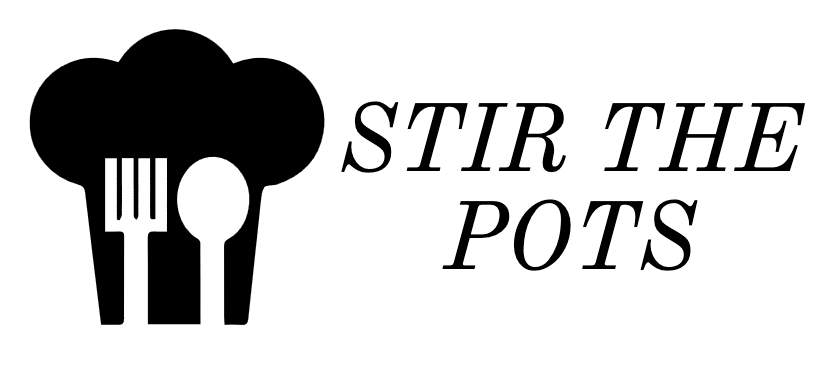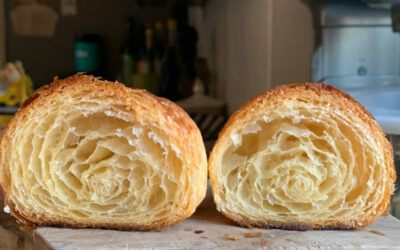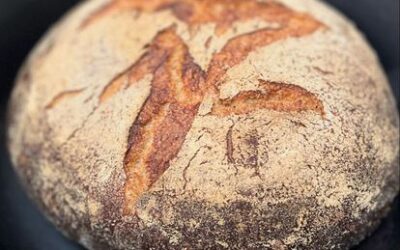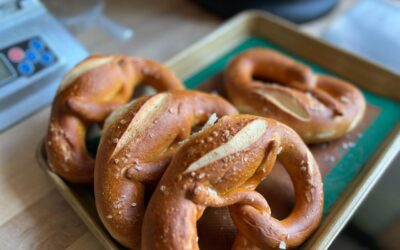
Süpke
I first heard about Bäcker Süpke from my friend Nils and have since eagerly visited his blog. Challenged as I am in German, through translations, I can get a feel for his bread language. For those who bake bread, it’s a kinship as old as the wheat or rye and maybe even older grain stock that unite water, salt and flour together in those delicious loafs we both love to eat and with which we identify. What I enjoy the most about German bread is its palate memory in my own life, having been born there, and especially living there as an American soldier during the Cold War. I imagine that while Herr Süpke was baking some DDR loaf, I was baking some hard tack biscuits protecting the free world not more than a stones throw from the East German border. Now no longer a soldier (thankfully), he has recently inspired me in making his often copied Lutherbrot. And recently I decided to dedicate that autumnal loaf to our next President, a sign that good bread can do a lot for human relations!

Luther
Anyway, rather than podcast, today we’re doing our own transcription. Enjoy the read, a record of our talk with master bread baker Wolfgang Süpke
Jeremy: How did you become a bread baker?
Wolfgang: I was apprenticing as a printer; unfortunately it was a government (SED) owned company. I had many drawbacks because of my religious beliefs. Therefore I tried to find another job. There were still independent employers in the backer trade and so I started a part time job in the bakery in my hometown. I really enjoyed working there and realized that this is what I want to do. So I made an apprenticeship as a backer and still work as one.
Jeremy:Being a baker from the former DDR, what did you find different in bread coming from the BRD (West Germany)?
Wolfgang: There was only one kind of Bread in the DDR (East Germany), while in the bread factories they offered two kinds of bread. I was impressed by the wide variety of bread in the BRD (West Germany).
Jeremy: What was bread like before and after the wall came down, or was it always the same?
Wolfgang:. The common bread is still the same but the quality has improved,the variety has reached the same level as in West Germany. Nowadays, whole grain and fiber rich bread are more common.
Jeremy: What is the “Slow movement”, political, social?
Wolfgang: “Slow baking” comes from the “slow food” movement. That means no more fast food, instead turning towards the basics, natural food and production processes, the pleasure of eating good food!
Jeremy: Hefe, (yeast) or sauerteig? (sourdough), Which is better?
Wolfgang: It depends, I take a sourdough for rye but I like a long fermentation yeast sponge for wheat. I use always a small amount of yeast for my sourdough. I have to control the mellowness because we have a certain cycle in the bakery. I would only use sourdough for rye breads as a home baker!
Jeremy: What is German bread? Some think of it as grainy loaves, dense. What defines the real German bread for you?
Wolfgang:There are more than 300 different kinds of bread in Germany, so it is impossible to say. Bread with 60%- 80% rye is popular in Thuringia but in the Rhineland they prefer rye-wholemeal with a special fermentation process so it’s pretty dark inside. In the southern part of Germany they like Wheat bread (20% rye and 80% wheat).
As a whole Germans love the variety, Multi-grain bread and wholegrain are more common as well as newly arrived Mediterranean bread e.g. “Ciabatta” and root bread (“Wurzelbrot”).
Overall I think typical German bread should include rye and ought too have a deep bake.
Jeremy: Why and how did you decide to blog about bread?
Wolfgang:I have a website for my bakery, but I always wanted it to be current and with something new on it, without having to ask the “internet-guy” all the time to change things. So I started to use word press to communicate with, and inform my customers about “slow baking” and everything else. It kinda turned into a blog on its own and got more popular than the website itself.
I really love blogging.
Jeremy: How do you think home bakers help the baking trade?
Wolfgang: Home bakers are very creative they always exchange about they’re experiences and ideas; I get a lot of inspiration from that. It also is a kind of marketing research, what are the trends and why don’t these people go to a bakery anymore?
Jeremy:How often do you change breads in your product?
Wolfgang: It depends how many Ideas I have. I made three new kinds of bread this year but I am changing rolls and cakes more often. There are regular customers of ours; they’re always buying the same bread so it is hard to omit something without protest.
Jeremy: Germans surprisingly are the largest bread consumers per-capita, has that increased the population of bakeries?
Wolfgang: No, there always been such a huge consumption, although the trade bakeries are regressive. A lot of people buy industrial bread because of economical reasons; their market share advanced about 30% to 50% in the last 10 years. The quality of the industrial manufactured bread got also better.
This is a reason for me to do slow baking, real artisan bread without any additives.
Jeremy: Has traditional artisan baking come to Germany like in the USA?
Wolfgang: How did it come to the USA? The traditional artisan baking is a result from the creation of guilds. They made regulations for the products (ingredients, materials, quality, price and how much everybody is allowed to produce). Nowadays they’re are free guilds and there is each for every trade (e.g. for image campaigns, interchange, information’s and against negative ordinances).
Jeremy: What makes German bread different from say Switzerland or France?
Wolfgang: Differences are rye flour, sourdough and the nationalistic signature, defensibility.
Jeremy: With the downturn in the world economy, do you think artisan bakers can re-emerge from under the shadows of bread factories?
Wolfgang: It could go both directions. I hope that the people start thinking in a way that at least they want to eat good food if they can’t get a new car or a nice vacation. That’s why they should go into a bakery more often; a negative thing would be if more people need government subsidy so they can’t really afford anything anymore.
Jeremy: How do you name your breads, for instance you have named your breads after hamsters and even Reformers?
Wolfgang: Before I started “slow baking” I always got new Ideas and matching names for them for bag men who sell bakery improver, so that I would buy their products. These days I am inventing the names, I got the idea to call one “schwarzer Hamster” (black hamster) after I read an article about an animal that just lives in our area and the name “Lutherbrot” (Luther bread) from a business magazine.
I always ask my saleswomen what we need in our product line or what kinda products the costumers demand. The names are my own creations; you just need to think long enough about it and the ideas will come on their own.
Jeremy: What are some tips to making a good German bread?
Wolfgang: You have to know how to make a good sourdough, a stone-oven and than you have to try it out.
Jeremy:Rye or wheat, which do you like better?
Wolfgang: I love both, such awesome natural materials; you can create so many things out of them. There must be a Creator.
Jeremy: Will you write a bread book?
Wolfgang: That’s a good idea, I’ll think about it!
And again I learned something from a blogger!
Jeremy: If someone wants to learn how to bake bread, go to school or go to Herr Süpke for a job?
Wolfgang: You need both.
Jeremy: How do you develop a formula for bread?
Wolfgang: I have a good computer program, you just have to put in, for example 5kg wheat, 3kg rye, 2kg spelt, 1kg curd etc. and it tells you how much water, sourdough and salt you need to add.
It’s an awesome program. Afterward’s I try out the recipe and let my bakers taste it, than we talk about the product so we can upgrade it. Only if they’re really enthusiastic about the new thing it will get into our shops.
Jeremy: What is your best selling loaf?
Wolfgang: The mixed-grain bread made out of 70% rye, 30% wheat with sourdough and lots of wheat starter.
Danke Sehr Baecker Süpke!




Cool interview, Jeremy. I think it is bakers like Mr. Süpke who help to change the way we think about bread and about food in general, especially taking care not to lose touch with the customers and home-bakers. Thanks for that.
Thanks Nils, As always I follow your lead in this mysterious mix of rye and water!
It would be cooler if I remembered the language, I feel so dumb! But Herr Süpke is one of the many bakers whom I feel without even meeting yet, that certain need to communicate as I always do about good things, particularly brot!
As one who has no German whatsoever, I appreciate the transcript. Great interview. I’m sorry I can’t read Herr Süpke’s blog. Please tell him I love the sleeping baker photo on his bakery’s home page.
Hi Jeremy,
what an interesting interview – I love it! I visited Baecker Suepkes bakery in Weimar, Thuringia on my way to Saxony, where we spend some days on a holiday.
http://schnuppschnuess.typepad.com/manzfred/2008/09/besuch-bei-bcke.html
I bought the “Schwarzer Hamster” bread, rolls and bread with a high percentage of wheat and seeds. It was all very delicious, but the Schwarzer Hamster bread was the best. It stayed fresh for several days and tasted very good.
It was really astonishing to read about Baecker Suepkes life in the DDR. Unbelievable that there were only two kinds of bread available. Thank you for interviewing Baecker Suepke and thank your for this inspiring blog.
Jutta
>in the Rhineland they prefer rye-wholemeal with a special fermentation process
Can be a bit to decipher, please?